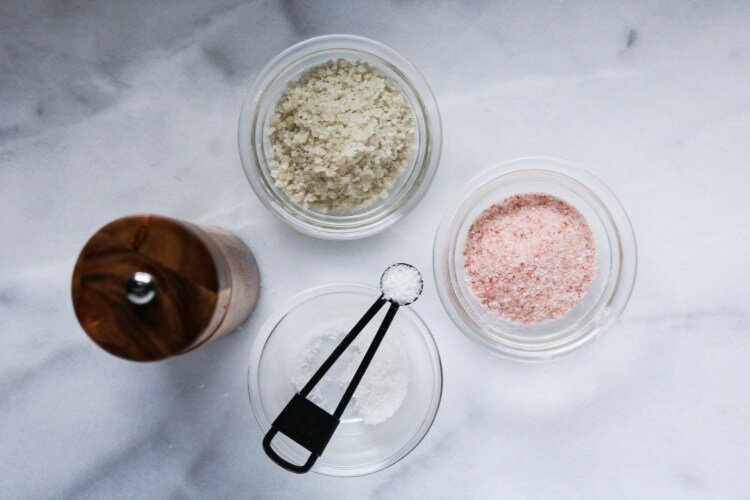Why You Need Salt in Your Diet and How to Choose the Best Kind
Several years ago I was so proud of the fact that I NEVER used salt in my healthy diet. I was a full believer that sodium was the cause of hypertension and poor health. However, salt is actually an essential nutrient! Little did I know that it is actually an amazing source of minerals that directly supports the adrenal glands, the kidneys, healthy hydration, and a healthy metabolism.
Like all things, quality makes all the difference. The sodium you find in processed foods is a far cry from the nourishing minerals found in quality salts.⠀⠀⠀
Why We Need Salt In Our Diet
Under stress, our adrenal glands burn through sodium at a faster rate making our dietary requirements increase. When there isn’t enough sodium, our adrenals respond by producing more cortisol thus increasing stress in the body (meaning hormone imbalance, slowed metabolism, poor digestion…). Kidneys rely on a healthy balance between sodium and potassium to keep us properly hydrated. Without a proper balance of sodium in the diet, we will excrete more water from our body thus leaving us feeling dehydrated, fatigued, and craving salty or sweet foods.
Salt supports many functions in the body like:
Promoting healthy hydration & electrolyte balance
Supports magnesium absorption
Reduces inflammation
Supports healthy sleep
Supports healthy thyroid function & metabolism
Balances stress hormones
Support a healthy menstrual cycle
Support healthy digestion & detoxification
Can help constipation
Can improve insulin sensitivity
What Kind Of Salt Should We Consume?
With so many different types of salt out there, how do you know which one will be the best for you? Here is the rundown on common salts so you can pick the best one for you!
White Sea Salt
Processed to remove impurities found in the ocean, white sea salt contains minerals like sodium, potassium, iron, and zinc. These trace minerals are nutrients we find ourselves deficient in today making it important to add to your meals. Because white sea salt has impurities removed, this is the best option to choose. I like Maldon’s Sea Salt.
Pink Himalayan Salt
While this is an extremely mineral-rich salt, it also contains Iron Oxide, a.k.a. rust, which gives it its pink hue. Due to this impurity, consuming too much of this can lead to iron overload in the body. Iron overload is actually more of an issue today than we realize. Fortified foods and copper deficiencies can actually cause your body to store iron in your tissues, which can actually appear as anemia.
Celtic or Grey Sea Salt
This salt contains natural magnesium, iron, manganese, zinc, iodine, and potassium. However, it gets its grey color from clay and impurities found in the ocean. While this kind is very mineral-rich, the impurities present may not be the best to consume regularly. As with so many things, moderation is key. If you consume this on occasion, you are getting a good boost of minerals but just remember the dark side of this product.
Table Salt
This product is stripped of all trace minerals leaving only sodium chloride. Because of this, non-caking agents and synthetic vitamins are added to this product to boost performance. You will commonly see these salts fortified with Iodine. This is NOT the iodine you want to be getting in your diet. If you are in need of iodine, you need to consume it from real, whole foods, not synthetic vitamins mixed with anti-caking agents. This kind of salt is never recommended in my book.
Cliff Note Summary
While colored salts may contain more variety in minerals, they may also come with their own impurities that may not be best for your health. Stick with white sea salt like Maldon’s.

